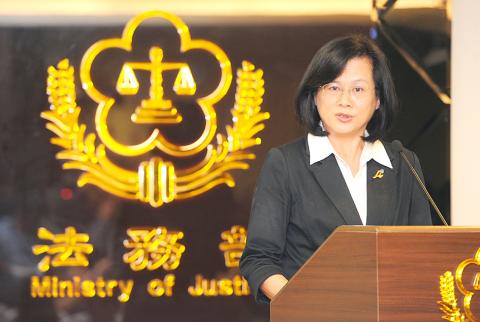An 11-member panel of the Ministry of Justice yesterday released its final report on the Special Investigation Division’s (SID) alleged wiretapping of the Legislative Yuan’s switchboard, concluding that the incident stemmed from administrative errors rather than a deliberate attempt to bug the legislature.
Deputy Minister of Justice Chen Ming-tang (陳明堂) told an afternoon press conference that Prosecutor-General Huang Shih-ming (黃世銘) and two SID prosecutors, Yang Jung-tsung (楊榮宗) and Cheng Shen-yuan (鄭深元), would be the subject of further investigation by the ministry’s Prosecutors Evaluation Committee.
The SID’s wiretaps of the legislature’s general line has been at the center of a political storm involving an alleged conspiracy by President Ma Ying-jeou (馬英九), Premier Jiang Yi-huah (江宜樺) and Huang to remove Legislative Speaker Wang Jin-pyng (王金平) from his post.

Photo: Lo Pei-der, Taipei Times
Huang and Yang, SID’s chief prosecutor, will be referred to the committee for supervisory negligence, while Cheng, the prosecutor overseeing the wiretap assignment, will be held accountable for administrative errors, according to the panel’s report.
The SID has said that it mistakenly assumed that the telephone number 0972-630-235 belonged to a legislative assistant and that nothing was recorded on the 21 compact discs it obtained from the Investigation Bureau from the wiretap.
The ministry’s ad hoc panel, established on Sept. 29, supported the SID’s stance, but said that the error could have been avoided.
Telephone records for that number in the six months before the SID began its wiretap showed that the number averaged about 364 calls a day during that time, which prosecutors should have realized meant that it might not be the number of an individual, Chen said.
Chen said the panel had concluded that the SID’s application to wiretap the number was legal.
The SID’s wiretapping became headline news after the division held two press conferences on Sept. 28. In the morning press conference, Yang said 0972-630-235 was not the legislature’s main number. Huang held the second press conference that evening to apologize for the mistake.
Opposition lawmakers had questioned the motive for wiretapping the legislature’s general line, seeing it as overtly political and part of a collaborative effort between Ma, Jiang and Huang to undermine Wang and the opposition.
The Democratic Progressive Party (DPP) caucus slammed the report as full of lies that “takes people for fools.”
“The report is unacceptable to the public,” DPP spokesperson Wang Min-sheng (王閔生) said.
Huang is under investigation by several agencies for discussing the wiretapping with Ma on several occasions even though the SID had not yet closed its investigation.

DAREDEVIL: Honnold said it had always been a dream of his to climb Taipei 101, while a Netflix producer said the skyscraper was ‘a real icon of this country’ US climber Alex Honnold yesterday took on Taiwan’s tallest building, becoming the first person to scale Taipei 101 without a rope, harness or safety net. Hundreds of spectators gathered at the base of the 101-story skyscraper to watch Honnold, 40, embark on his daredevil feat, which was also broadcast live on Netflix. Dressed in a red T-shirt and yellow custom-made climbing shoes, Honnold swiftly moved up the southeast face of the glass and steel building. At one point, he stepped onto a platform midway up to wave down at fans and onlookers who were taking photos. People watching from inside

A Vietnamese migrant worker yesterday won NT$12 million (US$379,627) on a Lunar New Year scratch card in Kaohsiung as part of Taiwan Lottery Co’s (台灣彩券) “NT$12 Million Grand Fortune” (1200萬大吉利) game. The man was the first top-prize winner of the new game launched on Jan. 6 to mark the Lunar New Year. Three Vietnamese migrant workers visited a Taiwan Lottery shop on Xinyue Street in Kaohsiung’s Gangshan District (崗山), a store representative said. The player bought multiple tickets and, after winning nothing, held the final lottery ticket in one hand and rubbed the store’s statue of the Maitreya Buddha’s belly with the other,

‘NATO-PLUS’: ‘Our strategic partners in the Indo-Pacific are facing increasing aggression by the Chinese Communist Party,’ US Representative Rob Wittman said The US House of Representatives on Monday released its version of the Consolidated Appropriations Act, which includes US$1.15 billion to support security cooperation with Taiwan. The omnibus act, covering US$1.2 trillion of spending, allocates US$1 billion for the Taiwan Security Cooperation Initiative, as well as US$150 million for the replacement of defense articles and reimbursement of defense services provided to Taiwan. The fund allocations were based on the US National Defense Authorization Act for fiscal 2026 that was passed by the US Congress last month and authorized up to US$1 billion to the US Defense Security Cooperation Agency in support of the

‘COMMITTED TO DETERRENCE’: Washington would stand by its allies, but it can only help as much as countries help themselves, Raymond Greene said The US is committed to deterrence in the first island chain, but it should not bear the burden alone, as “freedom is not free,” American Institute in Taiwan Director Raymond Greene said in a speech at the Institute for National Defense and Security Research’s “Strengthening Resilience: Defense as the Engine of Development” seminar in Taipei yesterday. In the speech, titled “Investing Together and a Secure and Prosperous Future,” Greene highlighted the contributions of US President Donald Trump’s administration to Taiwan’s defense efforts, including the establishment of supply chains for drones and autonomous systems, offers of security assistance and the expansion of